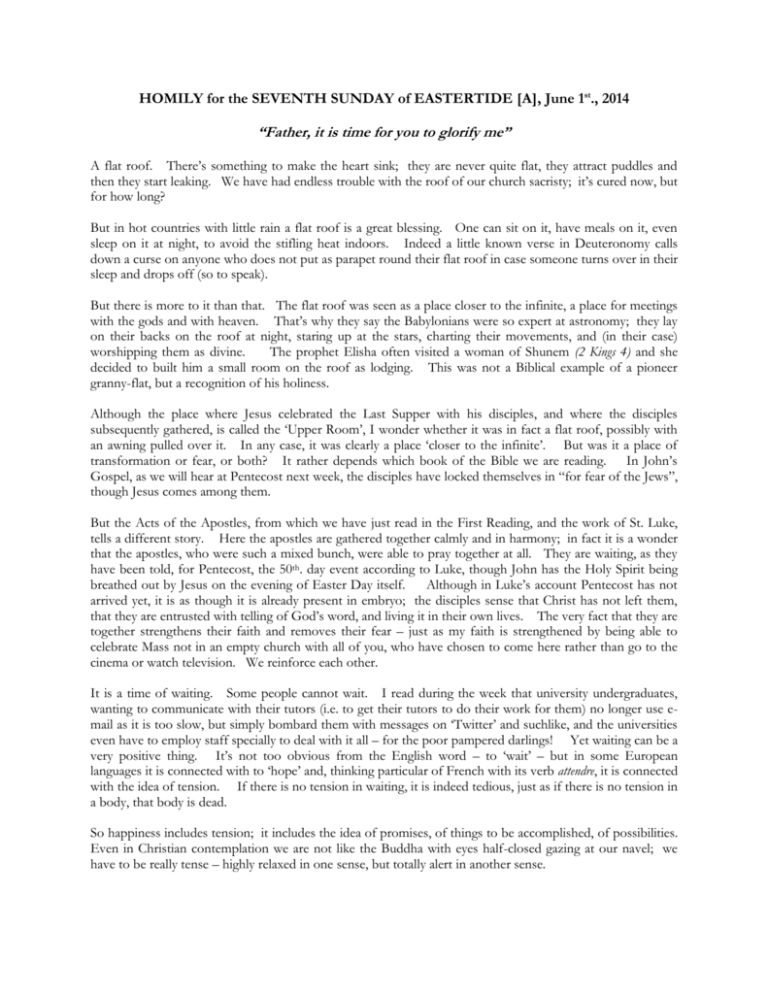HOMILY for the 27th Sunday of Ordinary Time, October 8th
advertisement

HOMILY for the SEVENTH SUNDAY of EASTERTIDE [A], June 1st., 2014 “Father, it is time for you to glorify me” A flat roof. There’s something to make the heart sink; they are never quite flat, they attract puddles and then they start leaking. We have had endless trouble with the roof of our church sacristy; it’s cured now, but for how long? But in hot countries with little rain a flat roof is a great blessing. One can sit on it, have meals on it, even sleep on it at night, to avoid the stifling heat indoors. Indeed a little known verse in Deuteronomy calls down a curse on anyone who does not put as parapet round their flat roof in case someone turns over in their sleep and drops off (so to speak). But there is more to it than that. The flat roof was seen as a place closer to the infinite, a place for meetings with the gods and with heaven. That’s why they say the Babylonians were so expert at astronomy; they lay on their backs on the roof at night, staring up at the stars, charting their movements, and (in their case) worshipping them as divine. The prophet Elisha often visited a woman of Shunem (2 Kings 4) and she decided to built him a small room on the roof as lodging. This was not a Biblical example of a pioneer granny-flat, but a recognition of his holiness. Although the place where Jesus celebrated the Last Supper with his disciples, and where the disciples subsequently gathered, is called the ‘Upper Room’, I wonder whether it was in fact a flat roof, possibly with an awning pulled over it. In any case, it was clearly a place ‘closer to the infinite’. But was it a place of transformation or fear, or both? It rather depends which book of the Bible we are reading. In John’s Gospel, as we will hear at Pentecost next week, the disciples have locked themselves in “for fear of the Jews”, though Jesus comes among them. But the Acts of the Apostles, from which we have just read in the First Reading, and the work of St. Luke, tells a different story. Here the apostles are gathered together calmly and in harmony; in fact it is a wonder that the apostles, who were such a mixed bunch, were able to pray together at all. They are waiting, as they have been told, for Pentecost, the 50th. day event according to Luke, though John has the Holy Spirit being breathed out by Jesus on the evening of Easter Day itself. Although in Luke’s account Pentecost has not arrived yet, it is as though it is already present in embryo; the disciples sense that Christ has not left them, that they are entrusted with telling of God’s word, and living it in their own lives. The very fact that they are together strengthens their faith and removes their fear – just as my faith is strengthened by being able to celebrate Mass not in an empty church with all of you, who have chosen to come here rather than go to the cinema or watch television. We reinforce each other. It is a time of waiting. Some people cannot wait. I read during the week that university undergraduates, wanting to communicate with their tutors (i.e. to get their tutors to do their work for them) no longer use email as it is too slow, but simply bombard them with messages on ‘Twitter’ and suchlike, and the universities even have to employ staff specially to deal with it all – for the poor pampered darlings! Yet waiting can be a very positive thing. It’s not too obvious from the English word – to ‘wait’ – but in some European languages it is connected with to ‘hope’ and, thinking particular of French with its verb attendre, it is connected with the idea of tension. If there is no tension in waiting, it is indeed tedious, just as if there is no tension in a body, that body is dead. So happiness includes tension; it includes the idea of promises, of things to be accomplished, of possibilities. Even in Christian contemplation we are not like the Buddha with eyes half-closed gazing at our navel; we have to be really tense – highly relaxed in one sense, but totally alert in another sense. And in this same Upper Room (on this same flat roof?) Jesus prayed his prayer before his Passion. As with his long speech to his disciples, we may wonder whether he actually said these words or whether the Gospel writer, realising the full significance of events afterwards, has put them onto Jesus’ lips. You may take your pick. In any case, it is all very different from the prayer at Gethsemane in the other Gospels. There is no agony. In fact it is the complete opposite of agony. One might even say that Jesus avoids the word to ‘die’, and uses a euphemism instead: “I am coming to you”. It represents the fulfilment of Jesus’ mission, and the key to it all is the word ‘glory’. When Judas Iscariot leaves the scene to betray Jesus, John’s Gospel tells us that Jesus said: “Now has the Son of Man been glorified”. Now if I say the word ‘glory’, what image does it conjure up to you? Dazzling light, maybe, or bright colours, cheering crowds, applause, a victory parade. One may be sure one would not associate glory with the word ‘heavy’. Bu that’s what the implication of the word is in Hebrew. Just as if I say ‘gold’ or ‘silver’, and you would think more of its glitter, or its value, but would probably not think of where those metals are in the comparative table of the weights of metals. But to the Hebrew mind ‘glory’ is something heavy, something with density. That explains a verse in 2 Corinthians (4:17) where Paul says: “Our light and momentary troubles are achieving for us an eternal glory that far outweighs them all”. Glory is ‘heavier’ than troubles. Now we would think of heaviness in the context of sorrow or suchlike, as when we do something ‘with a heavy heart’. But this now brings Jesus’ words vividly to life. Sorrow is heavy, but glory is heavy too. Just before this prayer, he had told the disciples: “You will be sorrowful, but your sorrow will be turned into joy”. Heavy sorrow becomes heavy glory. And just as the disciples before Pentecost are sharing their prayer, so when we share sorrow, when we offer compassion to the sorrowful, so that turns into joy, into glory, too. That is at the heart of the Christian message. As Christians we are called not to be passive or resigned. We are free, but sometimes think that God will fulfil all our immediate desires and whisk away all our troubles automatically; we may prefer to abdicate our liberty and want to receive God’s love ‘pre-packaged’. It’s all much more subtle than that. The disciples in the Upper Room are the first formation of the Church; they are the Church at its source. But of course a source is where water bubbles up from underground; there is mysterious water below which we cannot see. Those are the workings of the Holy Spirit, which will indeed bubble forth at Pentecost, and so form the river that is the Church. True, there is much in the history of the Church which is sorrowful rather than glorious, and the Church has often carried along much that is bad and useless, but then, doesn’t a river do that too? Our lives are open to the stars, like the Upper Room or the flat roof. While we wait, we are to be full of hope, not of despair, wondering and not downcast. The roof may be flat, but the Christian path to glory certainly isn’t.






